House And Senate Incumbent Re-Election Rates Top 90%
If you're a Member of Congress, the odds are pretty good that you're going to stay one.
If you were an incumbent member of the House or the Senate running for re-election in 2012, the odds are pretty good you made you pretty well:
Nine in 10 members of the U.S. House and Senate who sought new terms in office this year were successful, improving their record for re-election even as public approval of Congress sank to all-time lows.
The BGOV Barometer shows that 90 percent of House members and 91 percent of senators who sought re-election in 2012 were successful, exceeding the incumbent re-election rates of 2010, when 85 percent of House members and 84 percent of senators seeking re-election were successful. For senators, this year’s re-election percentage was the highest since 2004.
Voters were more likely to return their own representatives to office even though the public had a dim view of the legislative branch as a whole. Congress had a 21 percent approval rating on Oct. 15-16 after reaching all-time lows of 10 percent in February and August, according to Gallup polls. Just 10 percent of Americans said that members of Congress have high or very high honesty and ethical standards, according to Gallup data for Nov. 26-29.
“It wasn’t a ‘throw the bums out’ election, it was a ‘throw the bums in’ election,” John J. Pitney Jr., a professor at Claremont McKenna College in Claremont, California, said in an interview.
This contrasts with the 2010 elections, when 87% of the incumbents running in House elections were re-elected, and 84% of the incumbent Senators running for re-election were re-election. As noted, it’s also a higher re-election rate than we’ve seen in eight years, although the historical re-election rates of Members of Congress going back nearly 50 years have been fairly high except in unusual circumstances.
Here, for example, is a chart of the House re-election percentages going back to 1964 and updated through 2010:
Even in years where there were massive swings in control of the House, such as 1994, 2006, and 2010, you find that more than 85% of the incumbents running get re-elected. The reasons for this are well know. Incumbents have always had inherent advantages over challenges thanks to name recognition, and this is especially true in House Districts where representatives tend to be very “hands on” such that the voters are well aware who they are. Additionally, there’s the money advantage that incumbents naturally get both by virtue of interest groups who wish to curry favor with elected officials as well as the fundraising network they’ve built up from previous elections. Finally, there’s redistricting and the fact that vast numbers of incumbent Congressmen find themselves in districts that are so heavily tilted in the direction of one party that defeating them in a General Election is often next to impossible.
The chart for Senators looks a little bit different:
In past years, Senators have been in fairly precarious positions, such as in 1980 when only 55% of the Senators running for re-election were successful. In more recent years, though, re-election rates for Senators have historically been 75% or better and, except for a period from 1976 to 1980, there’s never been a time in the last 50 years when it was below 70%. So, even though Senators don’t have the same job security that Congressmen do, in no small part because they don’t have the advantage of gerrymandering, it’s still a pretty secure job even in times in political upheaval.
The broader point is that being a Member of either House of Congress is a pretty secure job. I’m not sure we should want it to be that way, though.
Charts via Open Secrets
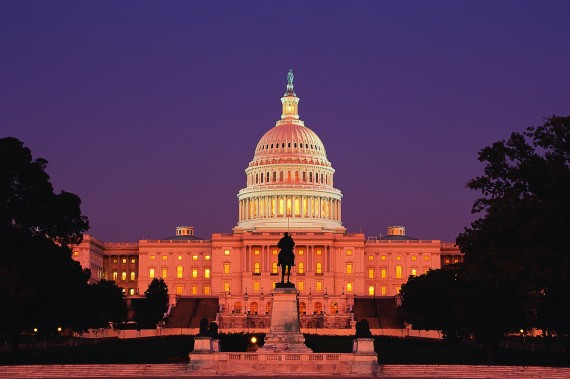
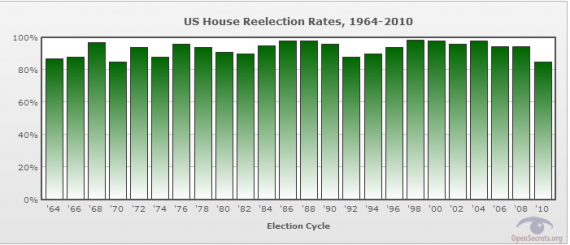
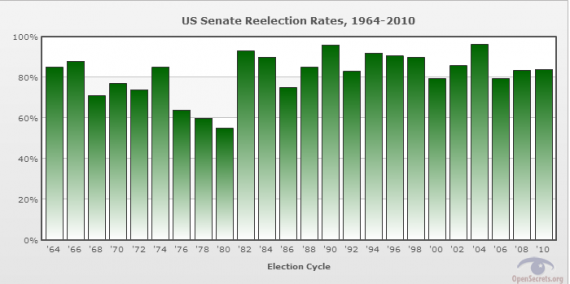



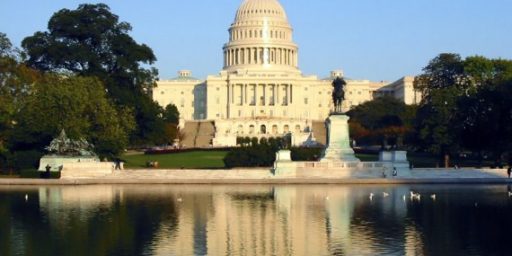
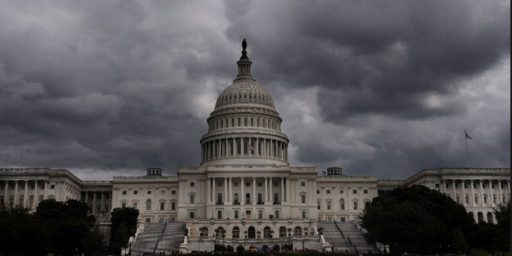

From those charts it appears the most recent “moment of clarity” so to speak for Zombieland occurred back in 1980. But we really don’t need charts to tell us that, do we?
@Tsar Nicholas: You mean right when household income began to stagnate?
Notice to US Representatives and Senators: Election 2014 – you’re fired !!
Incumbency is probably the biggest advantage any member of congress can have. Shoot Jessie Jackson Jr. didn’t campaign and won even though he was under investigation.
People will vote for the person they know and like time and time again. I will say that NH turns over fairly often. In the 12 years I have lived here few incumbents have been elected to second terms.
@Matt: No, Tsar means when Reagan and the Republicans embraced Keynesian economics and ran perpetual deficits to stimulate the economy. Or does that not fit his narrative?
Why, it’s almost like a large number of people are voting primarily based on inertia. But who or who could those benighted individuals be? Do you think that if they read more political blogs, or even contributed to them, inertia might stop being such a strong factor in voting for those people?
Nah. That’s just crazy talk, right?
The re-election rates basically show how unimportant campaigns and money are to politics. It also explains why the Democrats know that the easiest way to win more elections is to change the voters with immigration, birth rates, and education instead of trying to convince existing voters to change their voting patterns.
1980 can be thought of the last time that a demographic group moved from voting for one party to another.
Gerrymandering + natural advantage of already being there (can claim experience, has name recognition, etc).
Must be nice to be in one of those “safe” districts, eh?
There is nothing inherently good or beneficial about having a lot of turnover in DC.
I generally have a problem with the Republican portion of the 90% of incumbents who are routinely re-elected.
@al-Ameda:
The longer a politician is in DC, the more liberal they become and the less interested they become in their own district. Long term politicians see the government as the solution to all problems and want to continually grow the size and scope of the government. In addition, the long term politicians begint o see special benefits as some sort of entitlement.
The U.S. would be much better off is Congressmen served for a few year and then went back to their old district to live under all of the rules and law that they created. Having someone serve decades and then retire to DC or NYC just created a permanant ruling class who is disconnected from the general population.